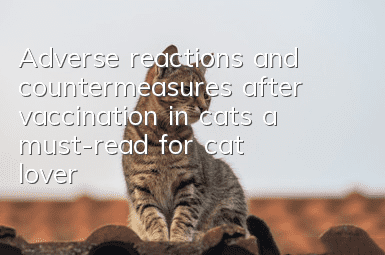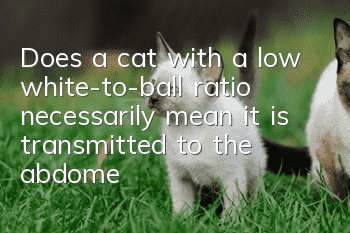Adverse reactions and countermeasures after vaccination in cats, a must-read for cat lovers!

Cat immunization can also cause some adverse reactions
Nowadays, pet immunization has become popular. For cats, triple vaccine, rabies vaccine, etc. are required from birth. In the past, people had doubts about pet immunity, thinking that it was not necessary for pets to be vaccinated, or they were worried about the toxicity of vaccines. With the development of animal medicine, vaccination has gradually been widely accepted by pet owners, and they have become more and more considerate of pets. It's becoming more and more like your own child, and you can't wait to immunize it. This is a big improvement between pets and humans. Adverse reactions and countermeasures after cat vaccination, a must-read for cat lovers!
Nowadays, vaccination has become increasingly complete, and many regular hospitals have their own set of vaccination procedures. However, with the increase in the number of vaccines, , the probability of side effects of vaccines is also increasing. Sometimes we feel that cats have adverse reactions after being injected with vaccines. This is also a problem that pet doctors and owners must pay attention to.
1. Why do vaccines cause adverse reactions?
First of all, as we all know, vaccines are biological products that stimulate the body to produce antibodies against specific pathogens, thereby protecting itself and preventing the spread of diseases to other animals. Once the vaccine is injected into the animal's body, it will cause a series of body reactions. Clinically, severe acute allergic reactions usually include swelling of the head and face, itching, weakness, diarrhea, difficulty breathing, and even shock and death. However, the acute reactions caused by vaccination in animals with different physiques are quite different, so animal owners have not paid due attention to it. For pet doctors, they should increase publicity in this regard in their daily work to make animal owners fully aware that vaccinations are also risky, so as to minimize the damage caused by acute allergic reactions to animals.
2. What are the adverse reactions of cats after vaccination?
Clinically, after vaccination, some cats may suffer from low-grade fever, depression, loss of appetite, lethargy, and weakness. These are all phenomena that may occur after vaccination. The vaccines currently on the pet market are basically attenuated vaccines, that is, artificially manufactured live vaccines with mild infectivity, which can produce clinical symptoms related to the inherent biological characteristics of the microorganism. Most clinical symptoms will reduce or disappear after 1-2 days. The pet doctor should inform the owner that the local site where the vaccine is injected will cause pain, swelling, inflammation, redness and other reactions within 30 minutes to a week. If the symptoms persist or tend to worsen, the cat owner should contact the veterinarian in time. Some animals may even develop localized abscesses, which is caused by the body's overreaction and not an infection caused by the vaccine.
According to statistics, one out of every 50,000 to 100,000 vaccinated animals will suffer from serious adverse reactions. These adverse reactions (including fever, stiffness of limbs, joint pain, susceptibility to other diseases, braininflammation, liver/kidney failure, and being a long-term carrier of the vaccine) usually appear 24-72 hours or 10-30 days after the injection.
Cats are usually more sensitive to vaccinations than dogs, so they are more likely to have adverse reactions. Since the early 1990s, a notorious adverse reaction has appeared in the cat world: malignant fibrous tumors caused by vaccination.
This type of malignant tumor mostly occurs in cats that have received multiple vaccinations. The location of the tumor is usually the same as the location where the cat received the injection. Once a cat suffers from this kind of tumor, most cats will have a short life! Because this malignant tumor is more stubborn than ordinary cancers; it can grow rapidly again in the same or adjacent locations within weeks or even days after surgery!
3. How to reduce the occurrence of side effects?
Cat owners are requested to pay attention to the injection location within a few months after their cat receives the vaccine. Generally, there will be slight redness and swelling after vaccination. If it disappears within a month, it is normal. Please do not worry. If the diameter of the red and swollen area exceeds 2 cm, or continues to grow within one month of injection, it must be checked by a veterinarian. In other aspects, we must also do the following:
1. Before vaccination, make sure the cat is healthy and do not hide the condition. It is not advisable to vaccinate when sick.
2. If the cat has ever had an allergic reaction after being vaccinated, the veterinarian should be informed in advance when receiving the vaccine so that the veterinarian can choose other brands of vaccines and pay close attention to any symptoms of the cat after vaccination. Series of reactions.
3. After each vaccination, the owner should observe the animal in the animal hospital for 30 minutes or even several hours before leaving. They should also accompany the cat as much as possible after returning home, because some cats may become pregnant 24 days after vaccination. Allergy symptoms may not appear until an hour later, and you should contact your doctor promptly at this time.
4. If the systemic reaction after vaccination is severe, appropriate symptomatic treatment can be given, such as adrenergic drugs, anticholinergics and analgesics. At the same time, increase drinking water appropriately, avoid strenuous activities, and keep the injection site clean.
5. Try to avoid taking a bath within one week of vaccination.
6. Cats generally only suffer from one disease, so the more complex the vaccine, the greater the burden on the cat’s immune system, and the higher the probability of adverse reactions.
It should be noted that the validity period of the feline plague vaccine is very long, usually 7 years, so there is no need to inject it again within 3 years.
- How to treat cats with skin diseases? Diagnostic testing techniques for cat skin diseases!
- How to get your cat to develop a good habit of using the litter box
- There is a small hard bump on the cat’s ear
- Cat loves you
- Does owning a cat really help you live longer?
- What is the IQ of Himalayan cats?
- Why do cats sleep in cat litter?
- Can cats take hair removal cream when they are pregnant?
- Pregnancy care and feeding principles for female cats
- Why do some female cats eat their newborn kittens?



